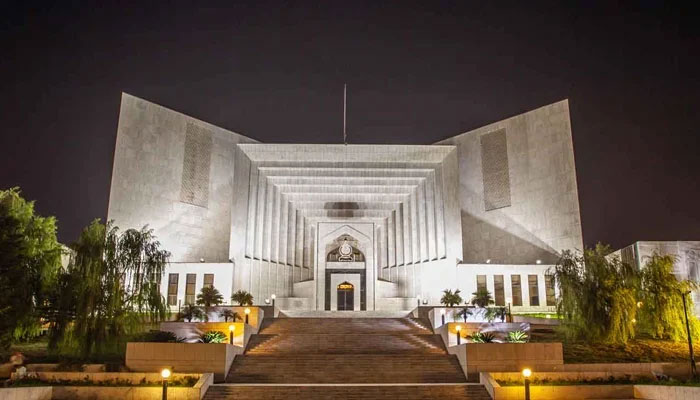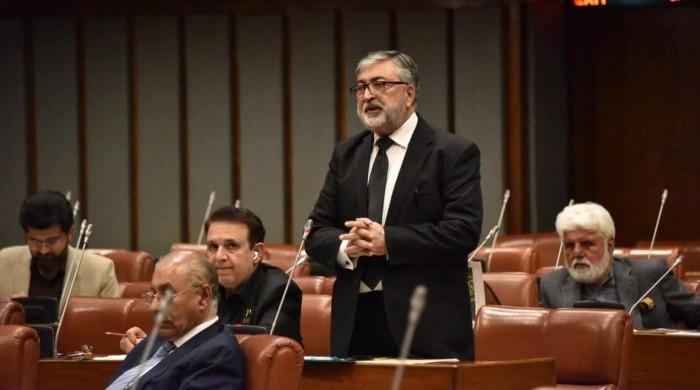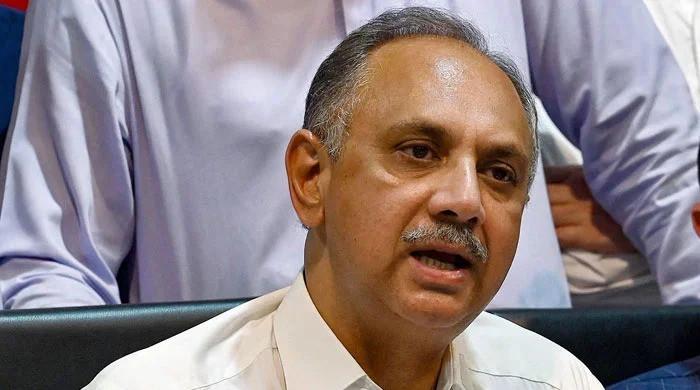Legal, political experts weigh in on verdict upholding law clipping CJP's powers
Hamid Mir says CJP Isa has "democratised" apex court by putting an end to the chief justice's "limitless" powers
October 11, 2023

Legal experts and analysts have hailed the Supreme Court of Pakistan's (SC) verdict upholding the SC (Practice and Procedure) Act, 2023, and termed the decision as a positive step towards the "democratisation" of the top court.
The full court, comprising all 15 judges of the apex court, announced the decision Wednesday, after conducting five live hearings.
Chief Justice of Pakistan (CJP) Justice Qazi Faez Isa noted that five members of the bench — Justice Ijazul Ahsan, Justice Muneeb Akhtar, Justice Sayyed Mazahir Ali Akbar Naqvi, and Justice Ayesha A Malik, and Justice Shahid Waheed — had opposed the law.
The verdict — acknowledging the parliament's right to legislation under Article 191 — will be effective from April 21, 2023, the day it was enacted, which means the SC verdicts under 184(3), which came after this date, can be appealed for review.
'Democratisation of Supreme Court' — Hamid Mir
The top judge along with his fellow judges has "democratised" the apex court by putting an end to the chief justice's "limitless" powers.
Through today's verdict, the door for politicisation of the SC has been closed which in the past was manipulated by dictators.
It'll be worth seeing how CJP Isa plays his role in ensuring the supremacy of law and the Constitution in the future.
Expected decision — Barrister Ali Zafar
It was expected that the majority of the judges would decide in favour of the SC (Practice and Procedure) Act 2023.
On merit, there was no doubt that such a law should exist that allows the right to appeal and devolution of CJP's powers with his senior colleagues.
Today's verdict sets out multiple legal points with the first one being that the Constitution is above everything.
The verdict also upheld parliament's supremacy and law-making powers, allowing it to promulgate any law while staying within the constitutional ambit while the interpretation of the law remains the discretion of the apex court.
But, the top court does have the right to exercise its authority if the parliament passes any law that is ultra-vires to the Constitution.
CJP Isa should be praised — Shahzeb Khanzada, senior analyst
It is a good decision and Barrister Ali Zafar (of the Pakistan Tehreek-e-Insaf) had also supported the law but wanted it to be done through constitutional amendment not by simple legislation.
He also said that reforms are needed in the superior judiciary.
CJP Qazi Faez Isa should be praised for showing a willingness to delegate his powers as we saw chief justices — including Iftikhar Chaudhry, Saqib Nisar, Asif Saeed Khosa, and Umar Ata Bandial — who centred all the powers in one individual and were not ready to delegate powers not even to their fellow judges.
They also did not convene full court meetings nor constitute full court benches which coined the term of like-minded judges.
The judiciary’s independence was being affected from within the judiciary.
But then a CJP assumes charge, convenes a full court meeting, forms a full court bench, starts live coverage of the proceedings, and says repeatedly that he doesn’t want to become ‘master of roster’.
And then comes the 10-5 verdict in which those judges who would become chief justice in the future like Justice Yahya Afridi and Justice Mansoor Ali Shah showed willingness to delegate their powers and opposed autocracy.
'Real aspect' yet to be seen — Barrister Ahmad Pansota
In my humble view, I think the decision to preserve that part of the law, which in essence was the good part, meaning thereby, the Supreme Court should be regulated and it should not rest in one man's hands, I think that part is appreciable, regardless of the fact that I still have reservations on the parliament passing this law.
Secondly, the greater the challenge was the appeal bit, which I believe has not been able to survive. This law on this count appeared to be class-specific, but it could not survive.
This is an interesting decision. The main part is to be seen once the final judgment comes out. But I think the real aspect has to be seen that after this judgment, what's the siphonage that parliament can make into the affairs of the Supreme Court of Pakistan?
'Best legal minds' — Mazhar Abbas, senior journalist
Only the best legal minds can judge the SC full court judgment o[f] 10-5 SC (court and procedure) Act, 202[3]. For the first time, people were able not only to witness the live coverage of the proceedings but also the verdict. Thank you.
'No shortage of law' — Lawyer Salaar Khan
For those who had been following the proceedings, this seemed the most likely outcome for the most part.
While many considered that the court might strike down the appeal in its entirety, fewer considered that it would only strike down appeals for cases already decided.
There’s little point getting into a more in-depth discussion on legal nuances until the detailed decision is out, but one thing is important to consider.
For all the discussion on the ‘divide’ within the Supreme Court, over the past five hearings, we saw that divide being articulated through consistently principled positions, grounded in particular understandings of the law.
For all its politics, in all of this, there was certainly no shortage of law.
The 'correct decision' — Barrister Reza Ali
It is essentially the correct decision that the SC (Practice and Procedure) Act has been upheld. For too long the SC has had arbitrary unstructured powers in deciding matters of public importance for which [neither] there was any [right to] appeal nor did it have any purpose except for a measly review which is not the same thing as the right of an appeal.
The attempt to structure the power of the SC and to make it subservient to the parliament is very important [...] Through arguments we know that the interpretation of Article 191 [of the Constitution] means that the powers of SC are subject to the constitution and the law and it appears that the law has been treated as any law promulgated by the parliament.
This is actually the rightful legacy of a SC whilst it is the interpretation of the constitution, it is always subservient to the whims, is always is, and always should be subservient to the whims of the parliament.
Notwithstanding the parliament's fractured setup which is illegal in some ways, particularly with respect to the two provincial assemblies, whichever way you want to interpret it, but on merits, it is the correct decision and it would be interesting to see what all the dissenting notes and the actual majority notes appear to suggest.
'Sad day' for judicial independence — Barrister Asad Rahim Khan
This SC is perhaps the first in history to have removed its own teeth. A desperate law – passed by the previous regime right after the judges ordered elections in 90 days – has now been dignified by the same court it aimed to repress. Parliamentary sovereignty demands amending the Constitution through a two-thirds majority, not bulldozing through a brand new jurisdiction via a rump legislature. A sad day for judicial independence.
'Dawn of judicial reforms' — Advocate Sheikh Saqib Ahmed
Qazi Faez Isa's first day in office as CJP evoked a sense of déjà vu reminiscent of the film 'Nayak' and for the very first time in history, we had the opportunity to witness live court proceedings questioning the validity of Supreme Court Practice and Procedure Act'2023.
The recent verdict by the Supreme Court, upholding the mentioned Act, undeniably marks the dawn of judicial reforms aimed at ensuring the 'fair' administration of justice, as guaranteed under Article 10-A of the Constitution. Crucially, it must not only be 'fair' but also be perceived as such.
We will no longer witness a one-man show in the apex court, whether in the formation of benches, the initiation of suo moto cases, or the fixing and transfer of cases.
Nevertheless, the same conventions and practices in the lower judiciary, including high court(s) and district court(s), went unquestioned.
As Roy Moore, an American Jurist puts it: "The basic premise of the Constitution was separation of powers and a system of checks and balances because man was perceived as a fallen creature and would always yearn for more power."
In the other part of the verdict SC declared sub-section (2) of section 5 of the Act (granting a right of appeal retrospectively) as ultra vires the Constitution by a majority of 8 to 7.
Yet, it remains a challenge for any lawyer or jurist to grasp the reasoning behind the seven dissenting judges' stance on the 'right of appeal' in a retrospective manner, even though it feels like we managed to score a six on the last ball.
'Verdict upholds Parliament’s right to legislate' — Ahmed Bilal Mehboob
I am glad that finally the verdict is out and it upholds Parliament’s right to legislate regarding the enforcement of constitutional provision (Article 184(3) regarding original jurisdiction of the Supreme Court.
I am glad that the absurd view of placing Supreme Court rules above the ordinary legislation passed by the parliament has been rejected.
Justice Qazi Faez Isa will be remembered and respected because he passionately and consistently supported more inclusive decision-making in Supreme Court even when it meant that he would have to share his powers with two other senior judges.
To me, the decision to not uphold certain parts of the law like the retrospective right to appeal made no sense but one needs to go through the detailed reasons to form a definitive opinion on that.











